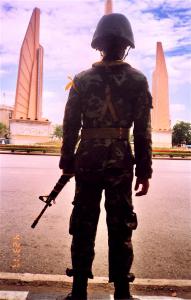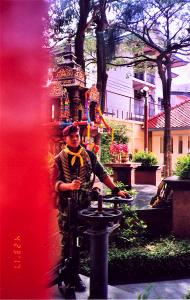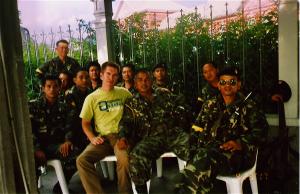I was unprepared for the events of September 19 when Thailand was swept up by a military coup. After a month teaching conversational English at the Land Mine Museum in Cambodia, I decided it was time to return to Bangkok.
What happens during a coup
Gossip spread fast on the bus from Siam Reap. I was told that tanks were roaming the streets of Bangkok; quite a surreal situation, There was also word that the population of the city was in agreement with the coup leaders, maybe because they had seen it before; there have been around four coups in Thailand since 1971.

 Trooper on guard duty
Trooper on guard duty
When I came to the border of Thailand via Poipet, Cambodia, I noticed there was definitely more border guards and soldiers than usual. The crossing seemed a little more tense, too. After passing through immigration, I boarded a bus headed for Bangkok. I wondered if it was the right decision, considering my impression of what happens when a coup takes place. I imagine rival political factions fighting in the street, massive protests opposing the military take over. These images conjured up by numerous Hollywood films I have watched in the past did not help.
I decided to pick my own bus rather than continue with the same bus company that I chose in Cambodia. If I had stayed on that bus, I would have been dropped off with the other foreign travelers at Kao San Road in Bangkok. The bus was full of Thais and as it would turn out, I was the only foreigner.
When I found my seat, a young Thai man and his girlfriend who sat across from me, struck up a conversation. He handed me a Thai newspaper, pointed to the cover: there was a photo of soldiers storming offices of the now overthrown Prime Minister, Thaskin. I thought: maybe this is not a good idea. But there was also a sense of excitement. I figured I could tell my children about this when I am an old fart.
We were halfway to Bangkok when the bus hit heavy traffic, around 10:00 p.m. That was when I looked out the window and saw my first armored personal carriers and troops. They were positioned in the middle of the highway directing traffic and pulling over random vehicles. Our bus halted at a military checkpoint. A Thai soldier in full battle gear entered. Everyone pulled out their identification. I did the same and handed the soldier my passport. He gave it a cursory glance and said thank you in Thai.

 Thai Paratrooper ready to receive
his " free cheeseburger"
Thai Paratrooper ready to receive
his " free cheeseburger"
This wasn't so bad. I fell asleep and woke up in Bangkok at 1:00 a.m. I passed out at my guesthouse after the exhausting 16-hour bus trip. I figured I might as well tour the city the next morning; take photos and get some information. I woke up and found that troops were positioned around the democracy monument. There were piles of food and soft drinks surrounding them instead of protesters; it looked comical. A BBC news broadcast warned foreign nationals not to mingle with the troops. This is Thailand, "The Land of Smiles". What could happen? On the other hand, Thailand is a complicated country. Too many in depth questions might give you answers you don't like.
I stopped at a Thai fast food joint for iced coffee and to chat with the waitress and the cook. We discussed where I could see the most action; tanks and other military hardware. The cook drew me a map and indicated, by drawing little tanks, where the troops were stationed. I asked him to write on the same piece of paper the equivalent of "Please let this foreign tourist take photos of your tanks and military vehicles. Thanks for your time" in English.
I started my "tour" of the coup by walking in the direction of the National Assembly Hall, which would take me past Government House, the United Nations building and the Education Ministry. The army had stationed troops at various sections of the city. For obvious reasons, concentration was at the government offices – a de facto military base. As I proceeded towards Government House, I noticed the road was blocked by tanks and troops. The international news media was filming the action in the middle of street, just under a massive billboard of the king.
I walked past what looked like an anonymous government building that was commandeered by Thai paratroopers wearing red berets. They were fully armed; machine guns and assault rifles. Some had grenades strapped to their belts and bandollier of ammunition wrapped around their bodies. The building was not so anonymous after all. I witnessed several citizens handing out flowers to the troops, as well as food.

 Myself and the old Thai NCO who gave me the
Buddhist medallion
Myself and the old Thai NCO who gave me the
Buddhist medallion
The king's plaza had a circus atmosphere. Twelve tanks were parked in the plaza. There were cotton candy vendors, school children passing flowers to the troops – strange, many people were posing for pictures. A bus load of female university students showed up in their sexy school uniforms; poised for photos with the troops. Returning in a daze from the weirdness of everything, I stumbled upon a unit of the queen's guard. I was high; thinking this was a big party. I conversed with the troops. It was unfamiliar to see soldiers sitting around at a intersection with their M16s neatly positioned for easy access, or tucked under their arms while Thai grandmothers brought them food and pinned flowers on their uniforms.
At this point in my five months spent in southeast Asia, I had basic Thai conversational skills. Communication with the troops was not a problem; they were friendly. Like most military units in the city, they had tied yellow strips of cloth to their uniforms and weapons. Yellow signified their sympathies were with the king; yellow also symbolizing royalty in Thailand. The soldiers were so relaxed, they were sitting on lawn chairs as if they were at a barbecue. Some of the grizzly looking NCOs seemed completely bored by the whole affair.
I moved on, thanked the Queen's Guard for their hospitality. I asked if I could take a group photo. I knew I was doing the typical tourist thing, but I wanted the picture for posterity. Afterwards, one of the NCOs pulled out a Buddhist medallion from his pocket, handed it to me and said I should carry it for good luck; it would protect me on my future journeys.
I understand Thai culture reasonably well. For me this was the best place to get caught in the middle of a military take over. I can't honestly say it wasn't stressful at times, though.